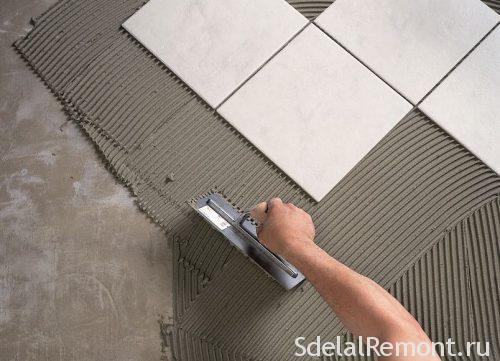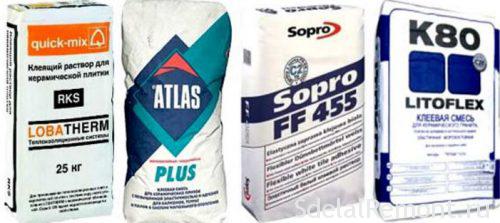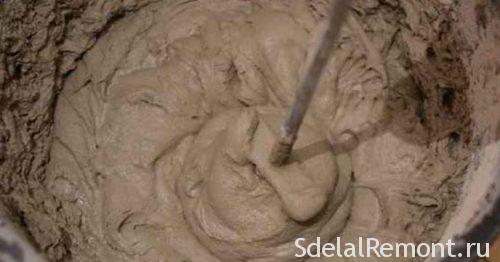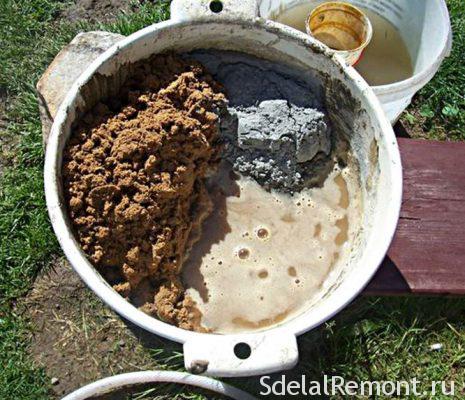A few of the key elements, which are used for veneering, become a mixture and Crosses for tile paving. And a pretty interesting point is the mixture becomes, because there are a number of its species, and in addition, can be used as a regular solution, and special adhesives.
A mixture of tile and its features
In solving cladding tiles using the first thing executed wall decoration. These elements can be used the usual solution, which is manufactured based on sand and cement, as well as ready-made adhesives.
Sold the finished adhesive can in the form of already prepared to use form, and in the form of powdered material, which must be diluted further. Preparation of mixtures is carried out strictly according to package directions.
Finished compositions are dry cement with the addition of special modifying agent. Usually found in packs of 5 or 25 kg.

some nuances
Considering facing floor, it should be noted most layer thickness, in contrast to the wall, which exceeds 3 mm. And that's why, a solution is needed for the tiles will be determined by several factors.
- First base evenness. Since the presence of irregularities, desirable to use grout, which not only serve as a glue, but also help to smooth out the bumps. In this case, the mortar layer thickness can reach 3 cm. In turn, use of the finished adhesive mixture requires a perfectly flat surface.
- Another important factor is the type of tile. considering, for example, granite, this material has a low adhesion, because the mixture of this type for laying tiles should be composed of special plasticizers, improve the rate.
- Influenced by the human factor, or rather, economic. Since the self-cooked mixture is less expensive finished, because, if everything points to the ability to use standard grout, it is better to use it.
speaking, by the way, question about saving, there are also several factors:
- When finishing the cement base, solution will be spent slightly more, than when installing on concrete.
- Also, there is another factor, on tiles. In particular, Glazed will claim for itself less solution, than unglazed.
The structure and composition
Considering ready glue for laying tiles on the floor, fully know the composition is virtually impossible, because it is the secret of the manufacturer. A big plus of such mixtures is, they are divided into different types, intended for different operating conditions and surfaces. Thus it is possible to allocate:
- universal adhesive. It used in standard conditions dyal flat surfaces.
- strengthened, which is often used when laying tiles fragile.
- unconventional compositions, intended, for example, for glass or metal tile.

Wherein, standard grout composition known to all. It is added to the cement and sand in various proportsiyayah depending on the grade of the first element. In particular:
- When cement M300 - 3 parts sand.
- For M400 - 4 parts sand.
- For the M500 or M600 - 5 parts.
The very same sand sifted necessarily, what is being done to remove debris and clay.
If necessary, to enhance adhesion, also add a standard PVA glue. It is added in proportions 1 to 50, wherein the first adhesive fraction value, and a second fraction of the total amount of the mixture. In more understandable, on 10 liter of solution, added 200 d clay.
Also, when it carried tile laying, tile adhesive does not always meet the requirements for flexibility and water resistance.
In some cases, detergents can be used to increase the elasticity. for example, liquid soap, shampoo or powder diluted.
If you want to improve the frost resistance, the special additives used for this purpose, for example, EU-30 primer. He is a universal hardening accelerator, what, respectively, confers resistance to low temperatures.
Preparation of the solution
Now we need to consider how to prepare the finished composition, and made yourself.
Ready-made dry mix
Let's start, perhaps, from ready mix. In this case, the first step is to carefully read the instructions, which is usually located on the packaging. In some cases, an additional attached.
Home - it does not pour water into the dry mixture, and do the opposite. Otherwise lumps remain, that affect the quality of. The very process of preparation is as follows:
- The container is filled with the required amount of water (the proportions specified in the instructions on the package).
- Thereafter, the mixture should start to stir slowly building a mixer or a drill with a special nozzle.
- Further, very carefully, gradually filled up very composition.
- Interfere with necessary throughout backfilling.
- She peremeshku conducted both during cooking, and immediately prior to application.

An important factor is the temperature of the water. It should not be cold, warm or hot. The liquid used strictly room temperature. Otherwise, the composition of the components may lose their properties. Immediately the room temperature during the work should be in the range of 10 to 24 degrees.
With the recommended temperature, the mixture for floor tiles solidifies rather quickly, it is not recommended to do large batches. It is desirable to prepare as adhesive, as you can use within 30-40 minutes.
As known, often soaked before laying tile, and the base itself is moistened. When laying on glue this is not recommended.
Slurry homemade
When, when selected independent preparation of a solution of, instead of glue for laying tiles on the floor, you need to know clearly, how to cook, what we'll talk further.
Preparation is as follows:
- Sand well dried and sieved.
- Further, it is mixed with a small amount of cement in accordance with the proportions, which have been mentioned earlier in the article, (depending on the brand).
- The next step is added to the water in the right quantity. After stirring the solution should get plastic, which will be held on the trowel's not sliding down.
- If the solution will be too runny, it is necessary to add a little sand and cement, if on the contrary, too dry, a little water.

Tile laying such as before be soaked, in this period of being in water 8-10 hours. Just to start, soak one tile, as in the case of, If you find a material of poor quality, then eventually perform under the enamel ugly yellow spots, that spoil the whole look of a room.
When, if after soaking and laying on a cement sample not lost appearance, then soaked and all the tiles. If soaking is not possible, then immediately before laying it is necessary to wipe the back side with a damp cloth.
When laying floor tiles in the tile adhesive self-cooking is carried out on a concrete base, Work is simplified. In this case, the process will be sufficient to pour water onto the surface, and through a spill cement. Further held tiling for a "test".
The most frequent errors
Often, when the fast tiling planned, in the preparation of the solution may be a number of errors:
- Often gets poor quality sand, not screened and dried, and is used in just such a hurry.
- Also unacceptable mistake becomes the use of the old cement, which often loses its properties.
- Water should be used only pure, In no case can not use sea water or dirty, the supernatant.
- The mixture should be mixed thoroughly, to leave no lumps, which entails a loss of quality.
- It is also a mistake becomes a tiling with high demands (for example, granite) a standard glue mixture or cement mortar.
It was a series of errors in the use of cement mortar, Now consider the use of ready-made compositions:
- Flatly banned the use of cold or hot water.
- You can not fall asleep first mixture, and then pour water, in that case will be formed lumps.
- You can not soak tiles moisturize or base.
- Containers for preparations must be clean, after each batch you need to clean and wash.
- Stir composition need at low rotation speed mixer. At high velocity the mixture will foam, lumps remain low.
And finally, a little advice, if you plan to laying tiles on tiles, what kind of glue used, help solve our article on this topic.
conclusion
Now you can decide what mix tile to use and how to cook it. For a more visual study of the topic, we offer watch a few videos.












